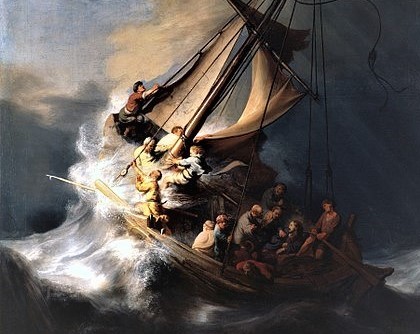
Calming Life’s Violent Storms
One of my favorite gospel passages, probably because it’s easy to see in the mind’s eye, is the story of Jesus and his disciples crossing the Sea of Galilee.
After a long day of preaching from a boat, from which he provided the parables of the sower and the seed, the lamp under the bushel, and the mustard seed to people seated on the shore, Jesus invited his disciples to accompany him across the lake. Exhausted, he fell asleep in the boat’s stern and kept sleeping even after a violent storm came up.
The boat began to take on water and the disciples, fearing for their lives, woke Jesus and said (probably yelled), “Teacher, do you not care if we perish?”
I’ve thought of this story many times in my life, when things weren’t going well, and when I felt distressed and helpless in the face of local, national and international disasters, natural and man-made. I’ve sometimes felt this way, and thought of this story, during this pandemic.
Also Called Lake Gennesaret
I did a little research about the Sea of Galilee, also called Lake Gennesaret, named after the ancient town of Gennesaret. At 680 feet below sea level, it’s the second lowest freshwater lake in the world after the Dead Sea.
Storms such as the one mentioned in the gospel result from a difference in temperatures between the lakeside and nearby hills. On one side, the hills reach 2,000 feet.
In the hills is cool, dry air. And directly around the lake, the climate is semi-tropical with warm, moist air. The resulting temperature and pressure changes result in strong winds that funnel through the hills and drop onto the lake. Storms can arise quickly without warning. Small boats are often in danger.
An Afterthought?
In the gospel story, Jesus calms the storm, but in my view, that was an afterthought. His main message: “Trust!”
In a recent blog entitled “The Fresco Painter,” I mentioned Raniero Cantalamessa, the Franciscan priest who preached at Good Friday services at the Vatican. Here’s more of what he said in that homily. It directly bears upon how such trust can serve us now.
“The pandemic of Coronavirus has abruptly roused us from the greatest danger individuals and humanity have always been susceptible to: the delusion of omnipotence. …It took merely the smallest and most formless element of nature, a virus, to remind us that we are mortal, that military power and technology are not sufficient to save us.
“God does this with us sometimes: he disrupts our projects and our calm to save us from the abyss we don’t see. This is also the case for natural disasters like earthquakes and plagues. He does not bring them about. He has given nature a kind of freedom as well, qualitatively different, of course, than that of human beings, but still a form of freedom—freedom to evolve according to its own laws of development.”
Invitation to Trust
The pandemic invites us, like the disciples in the boat, to trust in God and that should bring the feeling of solidarity – that feeling of being united and less in conflict with others. The virus knows no borders, said Cantalamessa, and we should forget about building walls.
“In an instant it has broken down all the barriers and distinctions of race, nation, religion, wealth, and power. We should not revert to that prior time when this moment has passed. …Let us not allow so much pain, so many deaths, and so much heroic engagement on the part of health workers to have been in vain. Returning to the way things were is the ‘recession’ of which we should have the most fear.”
Cantalamessa believes we should devote much less time to war, preparation for war and international one-upmanship and more “to the goals we now realize are most necessary and urgent: health, hygiene, food, the poverty fight, stewardship of creation. Let us leave to the next generation a world poorer in goods and money, if need be, but richer in its humanity.”


